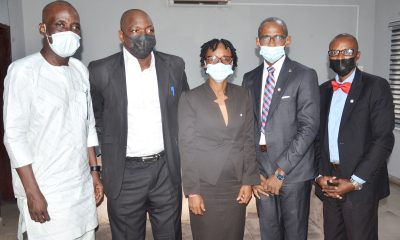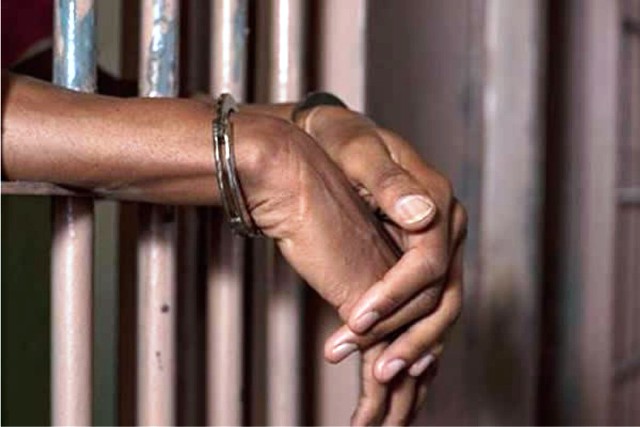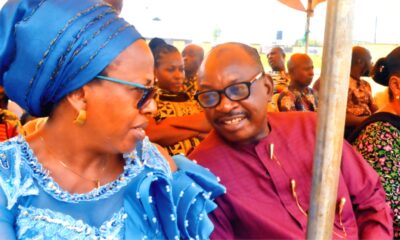Business
Brazil, US Talks To Focus On Trade
President Barack Obama and visiting Brazilian President Dilma Rousseff on Monday stressed the importance of strong ties between their countries, despite Brazil’s concerns about United States economic policies that it says can work against emerging economies, reports the CNN.
In comments to reporters after a White House meeting, Obama and Rousseff highlighted the areas of cooperation on energy development, education and trade as the two leaders prepare to attend the upcoming Summit of the Americas in Cartagena, Colombia, beginning Friday.
However, they made no mention of less collaborative topics, such as whether each country will purchase new military aircraft from the other, or whether the United States will support Brazil’s efforts to gain a seat at the U.N. Security Council.
Two-way trade between Brazil and the United States last year totaled around $74 billion, according to the U.S. Census Bureau, and the balance has gone from a U.S. deficit to a surplus in recent years.
Brazil has recently announced a series of measures to boost economic growth and rein in its overvalued currency, including slashing interest rates and levying taxes on short-term currency inflows.
At the same time, Brazil complains that low U.S. interest rates amid a sluggish recovery are hurting foreign trade partners.
On Monday, Rousseff and her foreign affairs minister both noted the U.S. trade surplus with Brazil, and Rousseff called for better balance in U.S. monetary and fiscal policies to prevent a depreciation of the dollar that harms emerging market trade partners.
Expansionist monetary policies, such as holding down interest rates, in isolation of fiscal expansion through increased investments, “ultimately lead to depreciation in the value of the currencies of developed countries, thus impairing growth outlooks in emerging countries,” Rousseff said.
Earlier, in comments to U.S. business leaders, Foreign Minister Antonio de Agular Patriota cited increased trade between the countries despite the global economic downturn of recent years, but he also called the Brazilian trade deficit with the United States “not ideal” and “a challenge.”
In particular, he said the United States now buys more Brazilian commodities and fewer of his country’s manufactured goods, adding, “this is something we have to look at very seriously, and we will.”
In her comments, Rousseff noted that the global economy’s “resumption of growth in the medium-term future certainly involves a substantial resumption of growth in the U.S. economy.”
“We very much welcome the major improvements that have been found in the U.S. economy in the recent past, and I am quite certain that that will very much be the emphasis in the next few months and years ahead under the capable leadership of President Obama,” she added in what amounted to either an endorsement or prediction of Obama’s re-election in November.
It is Rousseff’s first official visit to Washington as Brazilian president and comes more than a year after Obama went to Brazil, shortly after Rousseff came to power in the South American country.
In his own remarks to reporters, Obama emphasized Brazil’s rising influence in global affairs as a South American power that has become the world’s sixth-largest economy.
He cited “the extraordinary progress that Brazil has made” to become “not only a leading voice in the region, but also a leading voice in the world.”
In particular, Obama noted Brazil’s growing energy development and its growth into a leader in the biofuel industry as well as a major player in oil and gas development.
“The United States is not only a potential large customer to Brazil, but we think that we can cooperate closely on a whole range of energy projects together,” Obama said at a time when he is under attack from Republicans over rising domestic gas prices.
Speaking through a translator, Rousseff agreed that oil and gas development offered “a tremendous opportunity for further cooperation, both as regards the supply of equipment and provision of services, and also as regards a wider role in our trade relations.”
Business
LASG Makes Over N500m From Traffic Offences
The Lagos State Commissioner of Transportation, Mr. Oluwaseun Osiyemi, has disclosed that the recently introduced Traffic Management Solution Device (TMSD) has successfully captured 26,816 real time traffic infringements over the last three months.
Osiyemi, who stated this during a ministerial press briefing recently, said this development has made enforcement more effective and safe for officers to carry out.
The figure is arrived at based on the fact that the least fine for road traffic offence in the state is N20,000, and when multiplied by 26, 816, it comes to N536,320,000.
The government also vowed to intensify enforcement activities on fake enforcement officials across the State.
The Commissioner further disclosed that the Ministry, through its task force team, would carry out sting operations in different areas of the State until all impersonators are eradicated within the metropolis.
He explained that revealing details of the enforcement operations would sabotage its effectiveness and success, as the impersonators will devise methods to elude the State Government and persist in their unlawful act.
The Commissioner also disclosed plan by the State Government to take the transportation system to another level, through introduction of Compressed Natural Gas (CNG) buses by private investors, assuring that the State Government’s commitment to public transportation is to promote a transport system that is integrated and give options to its citizens.
According to him, towards facilitating the daily transportation needs of nearly 25 million commuters within Lagos State, a series of strategic initiatives have consistently served as instruments pivotal in advancing the first pillar of the THEMES+ development agenda.
Consequently, he said, there will be an expansion of infrastructure within the metropolitan, with the development of deep port in Badagry and construction of 4th Mainland Bridge, which are expected to commence soon.
Noting that the renewed effort of the Government towards making transportation in Lagos seamless for commuters, the Commissioner also said 250 electric cars have been shipped in by private investors to improve transportation in the State, while conserving the environment from air pollution through emission.
The Hon. Commission for Information and Strategy, Mr. Gbenga Omotosho, in his opening remarks described how important the Transportation Sector is to the economy and the well being of Lagosians.
Giving his remarks, the Special Adviser to the Governor on Transportation, Hon. Sola Giwa, stressed that the Lagos State Traffic Management Authority (LASTMA) is the only body backed by the Law to carry out enforcement and manage traffic within the state, saying Local Governments do not have traffic officers and they are not authorized by the law to apprehend motorists who commit traffic infractions.
Giwa also urged members of the public to avoid negotiating fines on the road with alleged enforcement officers to avoid being victims of impersonators.
Debunking the claims that fake enforcement officers apprehended last week around Cele axis worked for the Ministry of Transportation, the Permanent Secretary, Mr. Olawale Musa, confirmed that many of them are impostors, adding that it will be an anomaly for the Ministry to arrest and publicly shame its staff.
Business
Boat Mishap: CILT Advocates Safety Culture On Waterways …Claims 300 Nigerians In 2023
The Chartered Institute of Logistics and Transport (CILT), Nigeria, has expressed displeasure over the frequent loss of lives associated with passenger ferries on coastal and inland waterways.
Calling for more safety culture measures by users and stakeholders, President of CILT Nigeria, Barrister Mfon Usoro, in a statement last Thursday, disclosed that the institute’s Committee investigated incessant boat mishaps in Nigeria and discovered that over 300 lives were lost on the waterways in 2023.
Usoro, a former Director General of the Nigerian Maritime Administration and Safety Agency (NIMASA), said “An independent online investigation by the CILT, Nigeria Publicity Committee, revealed that over 300 lives were lost to different boat accidents across the country in 2023”.
Giving a vivid explanation on the mishaps in the nation’s brown waters, he said, “Recent ferry and boat fatalities recorded include: 5 Nollywood actors and crew in Asaba, Delta State; 3 medical students in Calabar, Cross River State; 3 passengers in Ibeshe, Ikorodu, Lagos State; 8 dead and estimated 100 persons declared missing in Borgu district, Niger State; 8 passengers in Anambra State.
“Overwhelming cause of the ferry disasters were the occurrence of one or a combination of the following factors: overloading, non-use of lifejackets, adverse weather conditions, human error, sub-standard boats and ferries, mechanical failures like engine breakdowns, inadequate safety measures, absence of navigational aids, non-availability of search and rescue services and regulatory gaps”.
She stated that safety of lives and property at sea/rivers is of paramount concern to everyone, especially in the light of recurring boat mishaps.
According to her, the incidents not only result in tragic loss of lives, but also pose significant economic and environmental risks.
The CILT boss stated that “While we support the use of inland waterways, it is saddened by the frequent loss of lives associated with passenger ferries in our coastal and inland waterways.
“While we support the use of inland waterway transports as an alternative and viable mode of transportation, the incessant ferry-related incidents resulting in fatalities has prompted a closer look at the deficit in safety culture and non-adherence to safety measures by the parties responsible for safety in our waters”.
Usoro, who is also a the former Secretary, Abuja MoU, said all stakeholders that constitute the “circle of responsibility” in safety of water transport “must work in collaboration to improve safety consciousness of ferry operators, jetty owners, and persons that use waterways transport”.
Business
‘Women Exclusion From Digital World Costs $1trn Worldwide’
The exclusion of women in the digital world has resulted in a whooping loss of $1trillion in the economies of developing nations in the last decade.
Chairman of the “MMS Hall of Famers’ Initiative”, Amb. Dr. Unyime-Ivy King, stated this during part of events to commemorate the 2024 “International Women’s Day” in Lagos State.
Making a presentation as Chairman of the occasion, with the theme, “Inspire Inclusion of Amazons”, Amb. King said the loss will increase by 50 percent in 2025 if nothing is done in this regard.
According to her, “Beside economic benefits, enhancing women’s safety and equal access to digital technologies, she noted that women-to-women support ranks as the greatest catalyst in achieving gender balancing.
Urging women over the world to reject the primitive customs that confines them to the kitchen, she said, “When we inspire others to understand and value women’s inclusion, we forge a better world. And, when women themselves are inspired to be included, there’s a sense of belonging, relevance and empowerment. Today, we are here to applaud them.
“One of our struggles is the sparse number of women in positions of power. From corporate boardrooms, to the courts and political leadership around the world, the small percentage of women in senior positions continues to stymie progress on issues from pay to humanitarian aid to discrimination in all its forms.
“The sooner we understand that the small number of women in leadership roles holds back not only women, but all people, the sooner we will be able to advance society as a whole”.
She emphasized that “the biggest challenge facing women today is patriarchy. This is especially evident in the realm of politics. Regardless of a woman’s experience, education or abilities, the patriarchal nature of the society fosters the perception that women are less qualified and less competent than men.
“What patriarchy has done is convince people that a strong and intelligent woman represents a problem; a disruption to the social order rather than an integral part of it. It is, therefore, no coincidence that many countries are completely out of step when it comes to electing a woman as President”.
Speaking further, she noted that Africa is notorious for creating the greatest challenge to the emancipation of women, especially in political leadership, saying that the era where women were confined to the background as domestic and family caretakers was over.
“While women have maintained the highest office of leadership in Liberia, India, the United Kingdom, Croatia, Dominica, to mention a few, the same cannot be said in Africa or globally. I believe the time has come for more women to get into top leadership positions in this country in various sectors”, she said.
She applauded women that have been selected to be inducted into the MMS Plus Hall of Famers, and urged them to be the torchbearer of gender balancing and empowerment.
Earlier, the Chief Executive Officer (CEO), MMS Woman of Furtune Hall of Fame Initiative, Mr. Kingsley Anaroke, said the theme of this year’s IWD is “Inspire Inclusion”, saying it’s “a muse that has provided another moment of sober reflection on the struggles over decades on gender diversity and request for the elimination of the inhibitive streams of bias and stereotypes.
-
Niger Delta3 days ago
C’River Declares NBS Child Labour Ranking Unrealistic
-

 Business3 days ago
Business3 days agoSMEs Critical For Sustainable Dev – Commissioner
-

 Featured3 days ago
Featured3 days ago118 Inmates Escape As Rainstorm Destroys Niger Prison
-
Politics3 days ago
Monarch Cautions Against Divisive Politics, Declares Support For Fubara
-
Sports3 days ago
AFN Lists Strong Squad For Bahamas Relays
-
News3 days ago
We’re Open To Partnerships To Enhance Status Of Rivers People -Fubara
-
Nation3 days ago
Banigo Decries Malaria Prevalence
-

 Rivers59 mins ago
Rivers59 mins agoCommittee Concludes Open Verification Of MIle 1 Market Allotees

